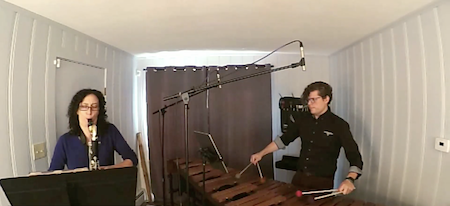by Jarrett Hoffman

That term “pre-recorded” can mean so many different things. In this case, marimbist Matt Sharrock noted that he and bass clarinetist Amy Advocat made the recordings earlier that day in single takes, “retaining some of the danger” of live performance. “There are mistakes,” Advocat said. “There are not!” Sharrock replied — the first sign of the refreshingly casual atmosphere they cultivated throughout.
First up, receiving its “web premiere,” was a work that shared the program’s title: Teerath Majumder’s Crossroads, in which the live-processed electronics make for unique and surprising articulations and timbres.
Taped electronics are the central component in Jen Wang’s intimate and compelling The Other Voice, which came next. Several people can be heard speaking about their own voice — often self-critically, almost always vulnerably, and sometimes reliving the cruelty of other people. In a way, the acoustic playing was an accompaniment: gentle and sensitive in the first movement, then insistent and incisive in the second.
In Kitty Xiao’s Emphysema feathered his appetites, unsettling, psychological electronics meet their match in intense acoustic sounds, including roaring multiphonics from Advocat. That work also explored an interesting dynamic between amorphous and precise music — liquid and solid, in relation to the painting that inspired it, as Sharrock said.
Michelle McQuade Dewhirst’s all-acoustic shenpa (from 2015, making it the oldest work on the program) followed with another engaging set of contrasts right from the start: deep, heavy long tones poured out from Advocat’s bass clarinet, to which Sharrock responded with feathery tremolos. From there, the interaction seemed to grow into a kind of face-off between the players, as if flexing and staring each other down before a battle. Momentum flagged just a little before the satisfying, reflective conclusion arrived.
Marissa Hickman’s Anatomy of the Infinite Machine is like a beautiful hypnosis. The opening brings echoing, abstract language from the electronics, and later on, that invisible voice begins to sing — ethereal and mesmerizing. Two other moments that stuck out: Sharrock used the opposite ends of his mallets to achieve an interesting, muted expression, and just before the end, Advocat seemed to cry out with desperation through her instrument.
The concluding piece, Yiyang Wang’s rhythmic and driving Converse II, was free of electronics but still, as Sharrock noted, “machine-like.” It received a tight, grooving performance with plenty of slap tongue and punchiness. Moreover, it felt very present, as if reaching through the screen — no easy task for performers or composers.
Throughout the hour-long concert, listeners could count not only on Transient Canvas’ engaging musicality and easy sense of ensemble, but also, as I mentioned above, on their sense of humor. That light-heartedness was the perfect recipe for a couple of short delays caused by technical problems. And while audio and video quality were not the most high-end, in a way that felt fitting for this personable and enjoyable recital.
The recital is still available on YouTube. You can also hear Transient Canvas on their third album, Right now, in a second, which will be released on New Focus Recordings on October 16.
Published on ClevelandClassical.com October 13, 2020.
Click here for a printable copy of this article



